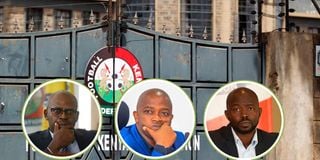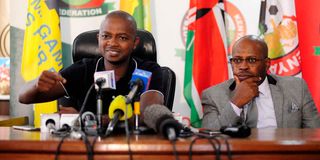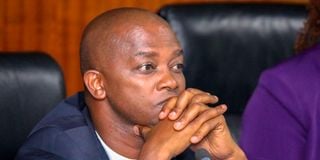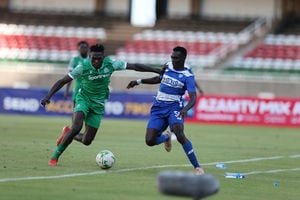
The entrance to FKF's Kandanda house in Nairobi. Inset (from left): Former FKF CEO Robert Muthomi, FKF president Nick Mwendwa and the current FKF CEO Barry Otieno.
One day in early 2016, the National Executive Council of the Football Kenya Federation held a meeting chaired by President Nick Mwendwa, at a time when Robert Muthomi was the Chief Executive Officer.
The gathering discussed how to spend hundreds of millions of shillings of Fifa development funds.
The NEC resolved to purchase an outside broadcast (OB) van, for a reported sum of Sh135 million.
It made both logic and economic sense at the time since South Africa-based Pay TV channel SuperSport had abruptly terminated their relationship with the local league organisers citing breach of contract.
Eight years later, the van has never been seen. In fact, it never even arrived in Kenya.
When Nation Sport broke this story, FKF was hard-pressed to explain the whereabouts of the money or the OB van. Mwendwa eventually admitted that the money was lost.
“We did everything overboard with total transparency. All I can say is the federation is currently a creditor after WTS Group, which sold us the van, went into administration,” Mwendwa said at a press conference in 2019 when questioned about the van.
It later emerged that the Sh135 million was allegedly paid to a broker who went under after listing FKF as creditors.
But this is just one among many instances where FKF has found itself battling allegations of misuse of funds.
When Harambee Stars qualified for the Africa Cup of Nations in 2019, after missing out for 15 years, FKF found themselves facing hard questions again, as some Sh244 million granted to them by the government to prepare Kenya for the continental football showpiece was irregularly spent.
Confederation of Africa Football, who were the organisers of the Afcon, footed local travel and accommodation for all participating teams.
Mwendwa ferried dozens of his staff, including his personal assistant, to the Afcon tournament in Cairo using taxpayers' money.

FKF President Nick Mwendwa (left) addresses a press conference with the then FKF Chief Executive Officer Robert Muthomi in Nairobi on October 23, 201.
As president, Mwendwa was the highest-paid official during that Egyptian tour, as he received Sh50,000 daily allowances for the duration of his stay in Cairo, while his deputy, Doris Petra, collected Sh45,000 daily.
That was not all.
A financial report that FKF presented to Parliament and seen by Nation Sport that same year indicated that Sh18 million from the government grant was channeled towards preparing the Under-20 national team for an Olympic qualifier.
The amount had been allocated towards preparing Stars to compete in a friendly match against Togo that never took place.
Questions emerged about whether the federation had been given the nod to divert funds meant for preparing Harambee Stars for the 2019 Nations Cup to preparing another national football team competing in a separate tournament.
“We were supposed to play Togo as part of our preparations but they cancelled at the last minute and we couldn’t find an alternative. We ended up using the money to prepare and cater for the junior national team’s travel and accommodation expenses as they faced Sudan in the Olympics qualifiers,” FKF CEO Barry Otieno said at the time.
The two-leg Under-23 game versus Sudan was played on March 20 and 26, a month before the government had approved the Sh244 million budget request that had been tabled by FKF.
The federation paid OneGoal Pro agency Sh106 million to cater for expenses incurred by Harambee Stars during their pre-Afcon camp in France.
OneGoal Pro was owned by Cameroonian Joe Kamga, who was at that time, Harambee Stars coach Sebastien Migne’s agent. This was a clear case of conflict of interest.
Another footnote in the financial document showed that Stars played three friendly matches as part of their preparations for the Afcon, which gobbled up some Sh63 million.
This was not entirely true as the team only played two friendly games, against Congo and Madagascar.
Curiously, none of the documents tabled in Parliament and at the Ministry of Sports showed that the federation had received some Sh77 million from CAF and online betting firm Betin for use at the Afcon.
These financial queries put the FKF leadership in the crosshairs with former Sports Principal Secretary Karimi Kaberia, and later with Sport Cabinet Secretary Amina Mohammed.
The CS disbanded the FKF on recommendations of a state-sanctioned probe report pending investigations for alleged corruption within the federation. The case collapsed early last year after the prosecution failed to produce enough evidence in court.

FKF President Nick Mwendwa when he appeared before the National Assembly Sports and Culture Committee in Nairobi on February 15, 2024.
The federation is expected to hold elections to choose new leaders later this year, but the body is at high risk of being declared an illegal organisaton, as it is yet to comply with the 2013 Sports Act.
In September last year, the government through Sports Registrar, Rose Wasike, threatened to revoke a provisional license it had issued to the federation after it failed to align its operations with the Sports Act.
“So far I have not cancelled FKF’s certificate not because of FKF but due to the interest of the athletes, technical officials and the fans. Please note that if FKF fails to adhere to the conditions attached to its registration within 60 days from the date of this letter, I will not hesitate to invoke the powers bestowed upon me under the section to cancel the aforementioned certificate,” said Wasike in a letter to FKF CEO Barry Otieno.
The deadline lapsed on December 8.
FKF and the Sports Registrar have repeatedly clashed over legal matters. Wasike declared that the FKF polls held in 2020 illegally, before a compromise was reached.
FKF is yet to be fully compliant with the Sports Act, and by extension, the laws of the land.









